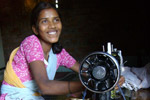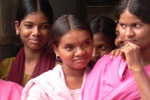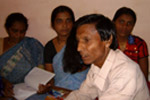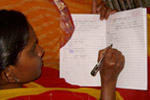In remote rural areas, similar to those in which the Ecumenical Sangam is working, it is sometimes difficult or even impossible to get a loan with reasonable conditions. This often restricts economic development, since poor but skilled, entrepreneurial and economically active people do not have any possibility of starting a small business due to a lack of capital. In this situation microfinance can help to foster economic development by providing small loans and other financial services at affordable interest rates and according to the special needs of the poor rural people. With the help of a small loan the productive rural population will be enabled to work independently and use their skills to gain higher levels of family incomes.
The Ecumenical Sangam's Microfinance (mF) scheme was originally started as a 'Rolling Loan' scheme to help the tailoring class students purchase sewing machines, with the students repaying the loan from their earnings. In July 2008 this scheme was extended to provide “refundable financial aid” to the former students of the Sangam’s technical and sewing classes. This financial aid is intended to be used for the start-up of small businesses in the rural villages and urban slums such as tailoring shops and repair businesses.
The Sangam makes a holistic approach to mF and every applicant who applies for the refundable financial aid has to attend obligatory training. In this training he or she will be introduced to the basic business-related topics, including business-plan making, marketing, book-keeping and other subjects which are on the Ecumenical Sangam's programme like health, hygiene, social matters or watershed.
The Ecumenical Sangam also plans to gradually extend its mF activities to the existing Self-Help-Groups in the area served by the Sangam and provide suitable training and financial aid to individual members of these groups. In adopting this approach to Microfinance the Sangam not only teaches the technical skills of how to work productively, but also assists in financial matters – especially in the very first stages of a new business, which often is a difficult time.
The mF Scheme continues to provide the marginalised with benefits, especially those seeking assistance to expand their small ventures, purchasing sewing or embroidery machines, low value tools and equipment. The personal touch of the Sangam's field staff helps to ensure the regular repayment of the instalments, as well as providing on the spot guidance to the beneficiaries. The mF co-ordinator and her team hold group meetings at regular intervals to monitor how the beneficiaries' plans are progressing.
The mF Scheme has recently been enlarged to include farmers who need financial assistance to purchase seed during their sowing operation. A number of meetings have been organised in the villages and the Sub-centres. Ms. Sureka Shende, the mF co-ordinator, explained the salient features of the scheme and answered the farmer's questions thus helping the farmers to understand how the Sangam's mF scheme operates.
To the beginning of April 2011 loans have been extended to 187 beneficiaries in the villages, some as individual loans, and some as Joint Liability Group loans. The mF scheme has been recently extended into the slums covered by the Sangam's Slum Team through loans through the women's Self Help Groups. To the beginning of April 2011, 15 loans have been made in the urban slums.
The initial funds to set up the Microfinance scheme have been made available through the Sangam's German Partner DIZ who in turn obtained a grant from the Hessian State Ministry of Economic Affairs.
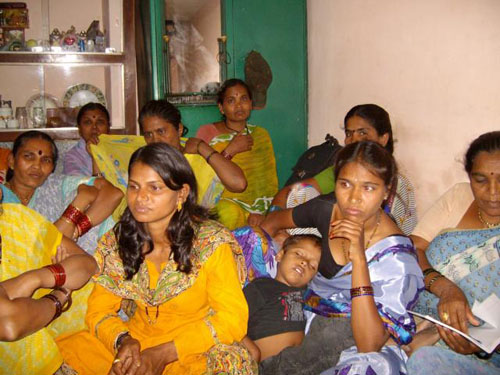
|

